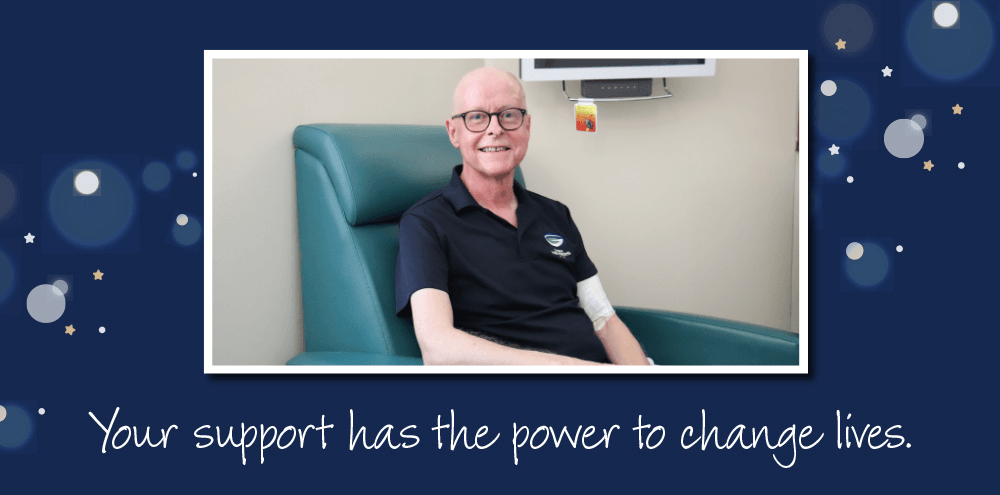Trevor’s Story

Following treatment for acute myeloid leukemia, Trevor Young recently left Mater Private Hospital Brisbane to go home to his three children and seven grandchildren.
Only recently diagnosed, Trevor had been feeling unwell for several weeks but woke on 29 June 2020 feeling extremely ill and went to his GP.
“My doctor took one look at me and told me to go to Mater Private Hospital Brisbane Emergency and ordered pathology testing to be done straight away. I was admitted immediately and later that day I was told I had leukemia,” Trevor said.
“It was an incredibly fast process as I needed to begin chemotherapy treatment the next day, my doctor Jason Butler said this was a very aggressive cancer and without treatment I only had two weeks to live.
“I was in hospital for three and a half weeks with the first round of chemotherapy, then I had a bone marrow biopsy done. Unfortunately, due to the aggressive nature of the cancer I had to come back into hospital for a further six weeks for a second round of chemotherapy.”
This was not Trevor’s first experience with cancer. In May 2019 he was diagnosed with prostate cancer which today only requires low grade monitoring.
“The chemotherapy for the leukaemia was a very aggressive form of treatment, but I am feeling much better now, I still get tired easily and have to rest, but my appetite is back which is really good,” Trevor said.
“Being in hospital during COVID has been tough with no visitors allowed. We have been Face-timing but it’s not the same.
“I feel I was always someone who appreciated life, but I have learned to appreciate it more now. This experience has made me realise anything can happen. I can’t thank the Mater staff enough; the nurses have been incredible to me while I have been here.”
Trevor will undergo further treatment with a stem cell transplant using donated tissue from his sister in some weeks’ time. In the meantime, he is looking forward to being able to sit outside in the sunshine and see his family.
Clinical Haematologist Dr Jason Butler explains acute myeloid leukaemia (AML) is a type of blood cancer usually arising from the bone marrow. It leads to an inability for the bone marrow to make healthy blood cells as the leukaemia cells or blast cells take over the body.
“Symptoms include tiredness, fatigue, fevers and sweats, bruising, bone pain and weight loss. They may have an infection that won’t get better, however some people have few symptoms,” Dr Butler said.
“Most people have no risk factors, although exposure to chemicals like petroleum, or previous chemotherapy or radiation treatment for another type of cancer can increase the chance of the disease developing and some other bone marrow diseases can turn into AML.
“AML is treated with intensive chemotherapy. Some patients will also receive new targeted treatments depending upon the subtype of AML. Many patients are best treated with a donor (allogeneic) stem cell transplant.”
Dr Butler said about 30-40 per cent of patients will have long term remission, or cure, with treatment. In patients fit enough to undergo treatment, up to 60 per cent will be cured.
“AML is relatively rare. Around three to four people per 100 000 are diagnosed each year. That equals around 900 to 1000 new patients per year. The average age of diagnosis is 65 to 70, but it can be diagnosed at any age including in infants,” Dr Butler said.
“At this stage, we are not aware of any lifestyle factors that appear to cause AML but appropriate protective equipment for workers in industries exposed to chemicals is very important.”
For now, Trevor is happy to be home with his family, going to the beach and watching his favourite sports—AFL and cricket.
Your support helps fund research that is striving towards the goal of zero lives lost to blood cancer by 2035.
Executive director of Mater Research, Professor Maher Gandhi, is a world leading researcher on blood cancer who is working towards a cure. “We’re very grateful for the support people give to the Mater Foundation, and that ongoing support is so critical for us, it means that people can continue to make discoveries which genuinely improve lives,” Prof Gandhi says.
Proceeds from Mater Cars for Cancer lottery helps to support vital research and patient care at Mater in Queensland. Your ticket is helping to transform the lives of patients like Trevor. Thank you!

We would love to hear from you
We would love to know what you think about Mater Lotteries!
1800 067 066
All times displayed in your local timezone unless stated otherwise. Mater Foundation Ltd as trustee for Mater Foundation is registered as a charity with the Australian Charities and Not-for-profits Commission. ABN 96723184640. All prices are displayed in AUD.



